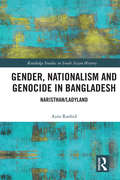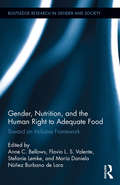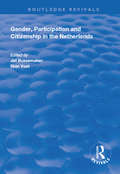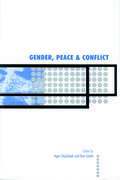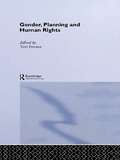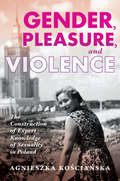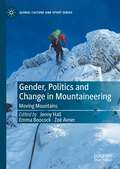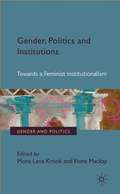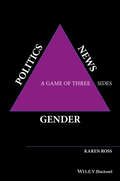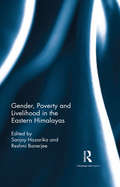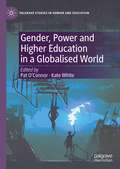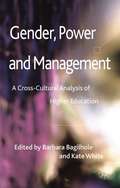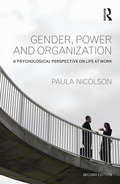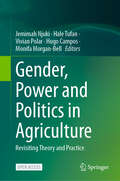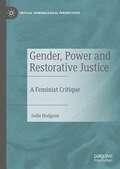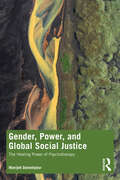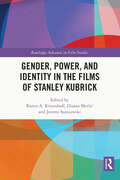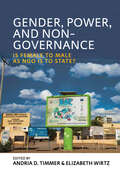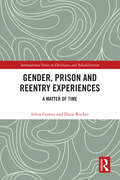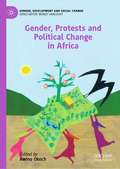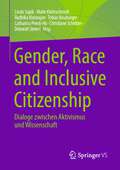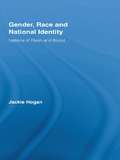- Table View
- List View
Gender, Nation, and Nationalism: Perspectives of Tibetan Women in Exile
by Amrita SaikiaThis book looks at the question of the Tibetan nation from the perspective of Tibetan women in exile. It situates Tibetan women within the debate of Tibetan nation-building and nationalism in exile. In doing so, the book explores Tibetan women’s construction of the idea of the Tibetan nation, their contributions to Tibetan nationalism, their position in Tibetan society, and the nuances of identity. The author captures the experiences, views, and realities of Tibetan women in exile, drawing from interviews conducted with participants in three Tibetan settlements in India.This book is an important contribution to feminist discourse on gender, nation, and nationalism in the context of the Tibetans in exile. It will appeal to readers and scholars interested in Tibetan studies, nationalism, feminism, women’s studies, and Asian studies.
Gender, Nationalism, and Genocide in Bangladesh: Naristhan/Ladyland (Routledge Studies in South Asian History)
by Azra RashidThe 1971 genocide in Bangladesh took place as a result of the region’s long history of colonization, the 1947 partition of the Indian subcontinent into largely Muslim Pakistan and Hindu India, and the continuation of ethnic and religious politics in Pakistan, specifically the political suppression of the Bengali people of East Pakistan. The violence endured by women during the 1971 genocide is repeated in the writing of national history. The secondary position that women occupy within nationalism is mirrored in the nationalist narratives of history. This book engages with the existing feminist scholarship on gender, nationalism and genocide to investigate the dominant representations of gender in the 1971 genocide in Bangladesh and juxtaposes the testimonies of survivors and national memory of that war to create a shift of perspective that demands a breaking of silence. The author explores and challenges how gender has operated in service of Bangladeshi nationalist ideology, in particular as it is represented at the Liberation War Museum. The archive of this museum in Bangladesh is viewed as a site of institutionalized dialogue between the 1971 genocide and the national memory of that event. An examination of the archive serves as an opening point into the ideologies that have sanctioned a particular authoring of history, which is written from a patriarchal perspective and insists on restricting women’s trauma to the time of war. To question the archive is to question the authority and power that is inscribed in the archive itself and that is the function performed by testimonies in this book. Testimonies are offered from five unique vantage points – rape survivor, war baby, freedom fighter, religious and ethnic minorities – to question the appropriation and omission of women’s stories. Furthermore, the emphasis on the multiplicity of women’s experiences in war seeks to highlight the counter-narrative that is created by acknowledging the differences in women’s experiences in war instead of transcending those differences. An innovative and nuanced approach to the subject of treatment and objectification of women in conflict and post conflict and how the continuing effects entrench ideas of gender roles and identity, this book will be of interest to academics in the fields of South Asian History and Politics, Gender and genocide, Women and War, Nationalism and Diaspora and Transnational Studies.
Gender, Nutrition, and the Human Right to Adequate Food: Toward an Inclusive Framework (Routledge Research in Gender and Society)
by Anne C. Bellows Flavio L. S. Valente Stefanie Lemke María Daniela Núñez Burbano de LaraThis book introduces the human right to adequate food and nutrition as evolving concept and identifies two structural "disconnects" fueling food insecurity for a billion people, and disproportionally affecting women, children, and rural food producers: the separation of women’s rights from their right to adequate food and nutrition, and the fragmented attention to food as commodity and the medicalization of nutritional health. Three conditions arising from these disconnects are discussed: structural violence and discrimination frustrating the realization of women’s human rights, as well as their private and public contributions to food and nutrition security for all; many women’s experience of their and their children’s simultaneously independent and intertwined subjectivities during pregnancy and breastfeeding being poorly understood in human rights law and abused by poorly-regulated food and nutrition industry marketing practices; and the neoliberal economic system’s interference both with the autonomy and self-determination of women and their communities and with the strengthening of sustainable diets based on democratically governed local food systems. The book calls for a social movement-led reconceptualization of the right to adequate food toward incorporating gender, women’s rights, and nutrition, based on the food sovereignty framework.
Gender, Participation and Agriculture: From Policy to Practice
by Faraha Nawaz Sangida Afrog RupaThis book presents an extensive study of women’s involvement in agricultural activities at the family level in rural Bangladesh, with a particular emphasis on their participation in decision-making. The authors examine the extent to which women are involved in decision-making regarding agricultural practices at family level. In addition to examining women’s contributions to various agricultural tasks, the research expands its scope to include discussions on gender inequality and empowerment, integrating these concepts into the decision-making framework. The authors argue that true participation should not only address the involvement of women in agriculture but also consider their influence on decision-making processes. They stress the importance of factors such as autonomy, control over resources, and self-confidence, which play a crucial role in shaping women’s decision-making ability within the family. Moreover, the research identifies several key barriers to participation, including entrenched patriarchal norms, societal cultural expectations, and institutional challenges, which hinder women’s active involvement in decision-making. The authors advocate for policy reforms and institutional changes to address these challenges, urging government bodies to align policies with their recommendations. The book provides valuable insights for policymakers, government officials, and NGOs working to promote gender-based approach and improve women’s empowerment in rural communities.
Gender, Participation and Citizenship in the Netherlands (Routledge Revivals)
by Jet Bussemaker Rian VoetPublished in 1998, this is an edited volume of papers on the theme of participation and citizenship for women. It focuses particularly on the necessary conditions for full participation of women as citizens within a modern liberal democracy. For this question it takes the Netherlands as an interesting case study, because it shows the need for a close connection between social and political participation. The editors aim to draw together often separate discussions about citizenship in international literature - a political-theoretical discussion of democracy and a social-policy discussion on the welfare state. The papers address issues including the labour market, public goods, welfare laws, affirmative action programmes and future development for girls. The book also develops the interrelation of social and political participation from the perspective of citizenship. It relates information on the Dutch case study to international comparative research on democracy and welfare states, as well as to broader international discussions on gender and citizenship.
Gender, Peace and Conflict (International Peace Research Institute, Oslo (PRIO))
by Dan Smith Inger Skjelsbæk- What impact does gender difference make to political decision-making? - Will the political empowerment of women contribute to a more peaceful world? The role of gender has been increasingly recognized as central to the study and analysis of the traditionally male domains of war and international relations. This book explores the key role of gender in peace research, conflict resolution and international politics. Rather than simply 'add gender' the aim is to transcend different disciplinary boundaries and conceptual approaches to provide a more integrated basis for future study. To this end it uniquely combines theoretical chapters alongside empirical case studies to demonstrate the importance of a gender perspective to both theory and practice in conflict resolution and peace research. The theoretical chapters explore the gender relationship and engage with the many stereotypical dichotomies like femininity and peace and masculinity and war. The case study chapters (drawing on examples from South America, South Asia and Europe, including former Yugoslavia) move beyond theoretical critique to focus on issues like sexual violence in war, the role of women in military groups and peacekeeping operations and the impact of a 'critical mass' of women in political decision-making. Gender, Peace and Conflict will provide an invaluable survey and new insights to a central area of contemporary research. It will be essential reading for academics, students and practitioners across peace studies, conflict resolution and international politics.
Gender, Planning and Human Rights (Routledge International Studies of Women and Place)
by Tovi FensterChallenging the traditional treatment of human rights cast in purely legal frameworks, the authors argue that, in order to promote the notion of human rights, its geographies and spatialities must be investigated and be made explicit. A wealth of case studies examine the significance of these components in various countries with multi-cultured societies, and identify ways to integrate human rights issues in planning, development and policy making. The book uses case studies from UK, Israel, Canada, Singapore, USA, Peru, European Union, Australia and the Czech Republic.
Gender, Pleasure, and Violence: The Construction of Expert Knowledge of Sexuality in Poland (New Anthropologies of Europe)
by Agnieszka KościańskaBehind the Iron Curtain, the politics of sexuality and gender were, in many ways, more progressive than the West.While Polish citizens undoubtedly suffered under the oppressive totalitarianism of socialism, abortion was legal, clear laws protected victims of rape, and it was relatively easy to legally change one's gender. In Gender, Pleasure, and Violence, Agnieszka Kościańska reveals that sexologists—experts such as physicians, therapists, and educators—not only treated patients but also held sex education classes at school, published regular columns in the press, and authored highly popular sex manuals that sold millions of copies. Yet strict gender roles within the home meant that true equality was never fully within reach. Drawing on interviews, participant observation, and archival work, Kościańska shares how professions like sexologists defined the notions of sexual pleasure and sexual violence under these sweeping cultural changes.By tracing the study of sexual human behavior as it was developed and professionalized in Poland since the 1960s, Gender, Pleasure, and Violence explores how the collapse of socialism brought both restrictions in gender rights and new opportunities.
Gender, Politics and Change in Mountaineering: Moving Mountains (Global Culture and Sport Series)
by Jenny Hall Emma Boocock Zoë AvnerThis book is the first edited collection to offer an intersectional account of gender in mountaineering adventure sports and leisure. It provides original theoretical, methodological, and empirical insights into mountain spaces as sites of socio-cultural production and transformation. The book shows how gender matters in the twenty-first century, and illustrates that there is a need for greater efforts to mainstream difference in representations and governance structures if we are to improve equality in adventure, sporting and leisure spaces. The interdisciplinary volume represents scholars from theoretical as well as applied perspectives across adventure, tourism, sport science, sports coaching, psychology, geography, sociology and outdoor studies.
Gender, Politics and Institutions
by Mona Lena Krook Fiona MackayPolitical institutions profoundly shape political life and are also gendered. This groundbreaking collection synthesises new institutionalism and gendered analysis using a new approach - feminist institutionalism - in order to answer crucial questions about power inequalities, mechanisms of continuity, and the gendered limits of change.
Gender, Politics and Society in Ukraine
by Olena Hankivsky Anastasiya SalnykovaGender, Politics, and Society in Ukraine is the first collection to examine how political, social, and economic transitions in post-Communist Ukraine are transforming gender roles and relations within the country. Leading Western and Ukrainian scholars and practitioners address a wide range of effects associated with and reinforced by these transitions - including the breakdown of the general welfare system, the lack of progress in the development of the healthcare system, gender inequality in political representation, the patriarchal nature of nation building, human trafficking, domestic violence, changing conceptions of fatherhood and masculinity, homelessness, and LGBT issues - from a variety of methodological and disciplinary perspectives.Gender, Politics, and Society in Ukraine is particularly innovative in its exploration of both women's and men's experiences and the ways in which gender relations shift over time in societies undergoing transitions to democracy. As such, this volume furthers the understanding of the complex obstacles and challenges of working towards gender equality in evolving democracies and identifies future priorities for research, politics, and policy development.
Gender, Politics, News: A Game of Three Sides
by Karen RossGender, Politics, News: A Game of Three Sides explores the role of gender in the broader processes of political communication The only contemporary book focusing on the relationships between gender, politics, and news media which takes a global perspective An analysis of political journalism as a practice and the development of the field in terms of gendered workplace cultures Offers a solid framework for understanding women’s political representation, including real world case studies of women’s campaigns for the top political job across a range of different geographies and contexts Coverage of hot-button issues, such as political scandal and the role of new and social media in politics and elections, makes this a highly relevant and current work with resonances for a wide audience
Gender, Poverty and Livelihood in the Eastern Himalayas
by Sanjoy Hazarika Reshmi BanerjeeThe Eastern Himalaya region covers a geographical area that spans five nations and has diverse landscapes, a multitude of ethnic groups and a rich variety of flora and fauna. The region is relatively poor in terms of GDP and per capita income; industrialisation and infrastructure is under-developed; climate-induced disasters are frequent; and maternal and infant mortality rates are high. Economic constraints combined with restrictive cultural norms create barriers for women in education, employment and decision-making, thus further entrenching unequal gender relations. This book explores the ways in which gender-sensitive and inclusive policies can be developed to address the basic issues of marginalisation, livelihood, poverty and vulnerability in the Eastern Himalayas. The chapters in the volume touch upon current concerns, such as the economic and social challenges faced by women, their control over resources, questions of patriarchy, discrimination, gender rights and equity, information, empowerment and participation, and women as agents of change. This volume will be useful to researchers and scholars in gender studies, sociology and social anthropology, development studies, economic and human geography, politics, northeast and Himalayan studies, South Asian studies, as well as policymakers and those in the development sector and non-governmental organisations.
Gender, Power and Higher Education in a Globalised World (Palgrave Studies in Gender and Education)
by Kate White Pat O’ConnorThis book examines persistent gender inequality in higher education, and asks what is preventing change from occurring. The editors and contributors argue that organizational resistance to gender equality is the key explanation; reflected in the endorsement of discourses such as excellence, choice, distorted intersectionality, revitalized biological essentialism and gender neutrality. These discourses implicitly and explicitly depict the status quo as appropriate, reasonable and fair: ultimately impeding efforts and attempts to promote gender equality. Drawing on research from around the world, this book explores the limits and possibilities of challenging these harmful discourses, focusing on the state and universities themselves as levers for change. It stresses the importance of institutional transformation, the vital contribution of feminist activists and the importance of women’s deceptively ‘small victories’ in the academy.
Gender, Power and Management
by Kate White Barbara BagilholeWomen are now part of senior management in higher education (HE) to varying degrees in most countries and actively contribute to the vision and strategic direction of universities. This book attempts to analyse their impact and potential impact on both organisational growth and culture
Gender, Power and Organization: A psychological perspective on life at work
by Paula NicolsonWork organizations are a major site of gender politics for professional women and men, and although there are more women in senior positions than ever before, these increased opportunities have not been gained without psychological consequences. Evidence-based and theoretically driven, the new edition of Gender, Power and Organization raises important questions about gender and power in the workplace, and the psychology of women’s advancement. Twenty years on from the first edition, it re-examines gender relations at work and asks why, despite many years of feminist critique and action, we are able to understand the dynamics of the workplace but fail to make them more representative. The struggles women face in professional and public life remain intense, not least because many men experience an increasing sense of threat to their long-term aspirations and professional positions. Using examples from recent research and the author's own consultancy experience, this important volume offers a fresh exploration of the psychology of gender and power at work, from the development of gender identities and roles, to explanations of bullying and sexual harassment in the organization. It offers an accessible survey of the subject for professional managers and students of leadership, psychology, management, sociology, gender, and women’s studies.
Gender, Power and Politics in Agriculture: Revisiting Theory and Practice
by Hugo Campos Jemimah Njuki Vivian Polar Hale Ann Tufan Monifa Morgan-BellThis is a open access book. In the agriculture sector, the language of gender integration often ignores the politics and the power dynamics that are central to critical, and feminist, analysis of gender relations. This volume explores largely neglected topics such as power dynamics, masculinities, gendered social norms, feminist research practice, intersectionality, critical analysis of tools and more, that are fundamental to shifting the entrenched power dynamics and politics of gender research in agriculture. The purpose of this book is to reduce the gap existing between theory, methods, and practice of gender relations in agriculture and agricultural research. Through an in-depth analysis of current processes in agriculture and drawing on existing experiences in other sectors, it seeks to create pathways for learning, catalyzing change and positive impact on gender equity and social inclusion. This volume seeks to bring forth a change in how gender relations in agriculture are researched, practiced and taught.
Gender, Power and Restorative Justice: A Feminist Critique (Critical Criminological Perspectives)
by Jodie HodgsonThis book ties restorative justice into the exercise of patriarchal power. It is focused on the individual narratives of 15 girls and young women who have participated in a victim-offender restorative justice (RJ) conference and the perspectives of youth justice practitioners. Gender, Power and Restorative Justice expands feminist engagement with RJ by focusing critical attention on the importance of the social construction of gender, the exercise of power, shame, stigma, muting and resistance to girls’ experiences of RJ conferencing. Drawing upon recent developments to the sociology of stigma and feminist perspectives on shame, the book contends that RJ conferencing can produce harmful implications for girls and young women who participate. Ultimately it is argued that anti-carceral, social policy alternatives, underpinned by feminist praxis, should replace a youth justice jurisprudence for girls. This book will be of particular use and interest to those studying modules on criminology, youth justice, criminal justice and social work courses.
Gender, Power, and Global Social Justice: The Healing Power of Psychotherapy
by Manijeh DaneshpourThis book analyses how practitioners can use psychotherapy as a healing mechanism, focusing on the intersection of gender, power, and social justice within the global context. It begins by interrogating the concept of social justice itself before examining men's and women’s issues from biological, sociological, contextual, and ecological perspectives. Each chapter covers individual, couple, and family therapy as well as training and supervising for heterosexual and homosexual individuals from a social justice standpoint. With a centered and balanced perspective about the impact of gender and power on men's and women's relationships to each other and their ecological contexts, Daneshpour aims to help mental health practitioners privilege client voices, promote justice in gendered relationships, and manage the impact of socio-political issues in therapeutic practice.
Gender, Power, and Identity in The Films of Stanley Kubrick (Routledge Advances in Film Studies)
by Jeremi Szaniawski Karen A. Ritzenhoff Dijana MetlićThis volume features a set of thought-provoking and long overdue approaches to situating Stanley Kubrick’s films in contemporary debates around gender, race, and age – with a focus on women’s representations. Offering new historical and critical perspectives on Kubrick’s cinema, the book asks how his work should be viewed bearing in mind issues of gender equality, sexual harassment, and abuse. The authors tackle issues such as Kubrick’s at times questionable relationships with his actresses and former wives, the dynamics of power, misogyny and miscegenation in his films, and auteur ‘apologism’, among others. The selection delineates these complex contours of Kubrick’s work by drawing on archival sources, engaging in close readings of specific films, and exploring Kubrick through unorthodox venture points. With an interdisciplinary scope and social justice-centered focus, this book offers new perspectives on a well-established area of study. It will appeal to scholars and upper-level students of film studies, media studies, gender studies, and visual culture, as well as to fans of the director interested in revisiting his work with a new perspective.
Gender, Power, and Non-Governance: Is Female to Male as NGO Is to State?
by Andria D. Timmer and Elizabeth WirtzUsing Sherry Ortner’s analogy of Female/Nature, Male/Culture, this volume interrogates the gendered aspects of governance by exploring the NGO/State relationship. By examining how NGOs/States perform gendered roles and actions and the gendered divisions of labor involved in different types of institutional engagement, this volume attends to the ways in which gender and governance constitute flexible, relational, and contingent systems of power. The chapters in this volume present diverse analyses of the ways in which projects of governance both reproduce and challenge binaries.
Gender, Prison and Reentry Experiences: A Matter of Time (International Series on Desistance and Rehabilitation)
by Silvia Gomes Dixie RockerThis book explores the unique reentry experiences of incarcerated men and women who are about to be released from prisons in Portugal. By analysing gendered reentry experiences through the narratives of men and women, Gender, Prison and Reentry Experiences sheds light on current practices and strategies adopted in prisons regarding reentry and examines the structural, institutional, and personal barriers that infl uence the reentry outcome.Gender, Prison and Reentry Experiences examines the narratives built around an individual’s prison experiences, their perception of the prison’s impact on reentry, and their expectations after release. It reveals how men and women narrate and attribute meaning to their time in prison and how they navigate their ‘prisoner’ and ‘gendered’ identities. In doing so, this book demonstrates the importance of these identities in relation to recidivism and desistance, while also questioning the role incarceration has in further criminalising and obstructing an individual’s reentry process. It puts forward recommendations that aim to improve the lives of all incarcerated individuals within the current system, in addition to advocating for decarceration and prison abolition. It presents a novel contribution to the internationalisation of knowledge across multiple disciplinary subfi elds, namely critical reentry studies and feminist criminology, fi lling a gap in the current knowledge as few studies focus on prison experiences as a core aspect of understanding the reentry process.An accessible and compelling read, this book will appeal to students and scholars of criminology, sociology, law, desistance studies, and those interested in gaining a unique insight into the experience of incarcerated individuals.
Gender, Protests and Political Change in Africa (Gender, Development and Social Change)
by Awino OkechThis book brings together conceptual debates on the impact of youth-hood and gender on state building in Africa. It offers contemporary and interdisciplinary analyses on the role of protests as an alternative route for citizens to challenge the ballot box as the only legitimate means of ensuring freedom. Drawing on case studies from seven African countries, the contributors focus on specific political moments in their respective countries to offer insights into how the state/society social contract is contested through informal channels, and how political power functions to counteract citizen’s voices. These contributions offer a different way of thinking about state-building and structural change that goes beyond the system-based approaches that dominate scholarship on democratization and political structures. In effect, it provides a basis for organizers and social movements to consider how to build solidarity beyond influencing government institutions.
Gender, Race and Inclusive Citizenship: Dialoge zwischen Aktivismus und Wissenschaft
by Linda Supik Malte Kleinschmidt Radhika Natarajan Catharina Peeck-Ho Tobias Neuburger Christiane Schröder Deborah SielertDer zweisprachige Band untersucht Kämpfe und Regimes der Zugehörigkeit und diskutiert „Inclusive Citizenship“ in Originalbeiträgen und Konversationen von internationalen Forscher*innen und Aktivist*innen. Im Spannungsfeld von Acts und Regimes of Citizenship stellen sich hochpolitische Fragen der Agency zu Bewegungsfreiheit, digitalen Rechten, Zugehörigkeit zum städtischen Raum, Care und Sprache. Wir diskutieren diese im lokalen, regionalen, digitalen oder (trans-)nationalen Raum zu aktuellen Migrationsbewegungen nach und in Europa, rassismuskritischem und (queer-)feministischem Aktivismus gegen institutionelle und Alltagsdiskriminierung in ungleichen Gesellschaften.The bilingual volume examines struggles and regimes of belonging and discusses "inclusive citizenship" in original contributions and conversations by international researchers and activists. Between acts and regimes of citizenship, highly political questions of agency emerge about freedom of movement, digital rights, belonging to urban space, care, and language. We discuss these in local, regional, digital or (trans-)national space regarding current migration movements to and in Europe, and critical racism and (queer-)feminist activism against institutional and everyday discrimination in unequal societies.
Gender, Race and National Identity: Nations of Flesh and Blood (Routledge Research in Gender and Society #Vol. 17)
by Jackie HoganAll nations construct stories of national belonging, stories of the nation’s character, its accomplishments, its defining traits, its historical trajectory. These stories, or discourses of national identity, carry powerful messages about gender and race, messages that reflect, reproduce and occasionally challenge social hierarchies. Gender, Race and National Identity examines links between gender, race and national identity in the US, UK, Australia and Japan. The book takes an innovative approach to national identity by analyzing a range of ephemeral and pop cultural texts, from Olympic opening ceremonies, to television advertisements, letters to the editor, broadsheet war coverage, travel brochures, museums and living history tourist venues. Its rich empirical detail and systematic cross-national comparisons allow for a fuller theorization of national identity.

